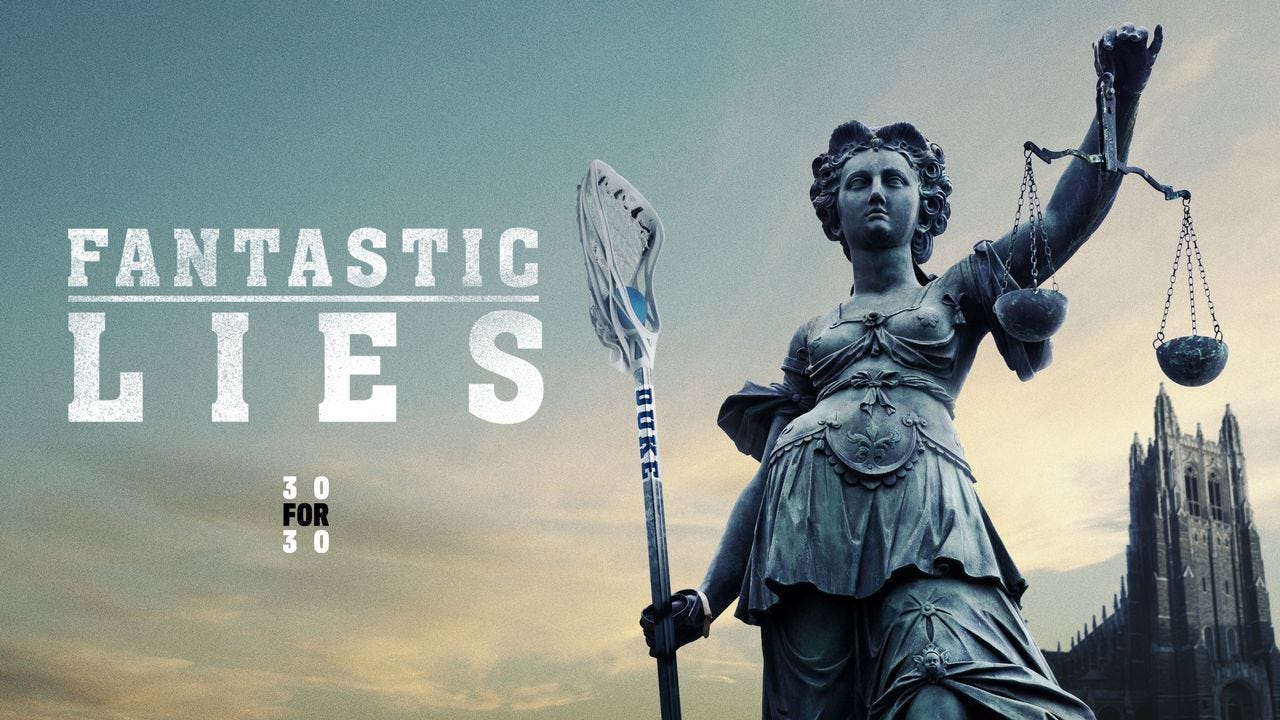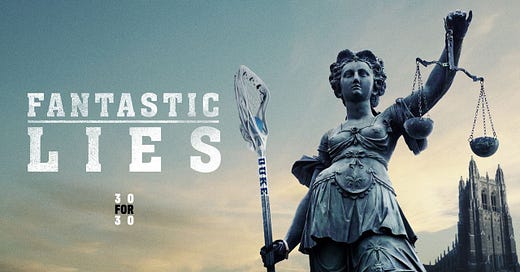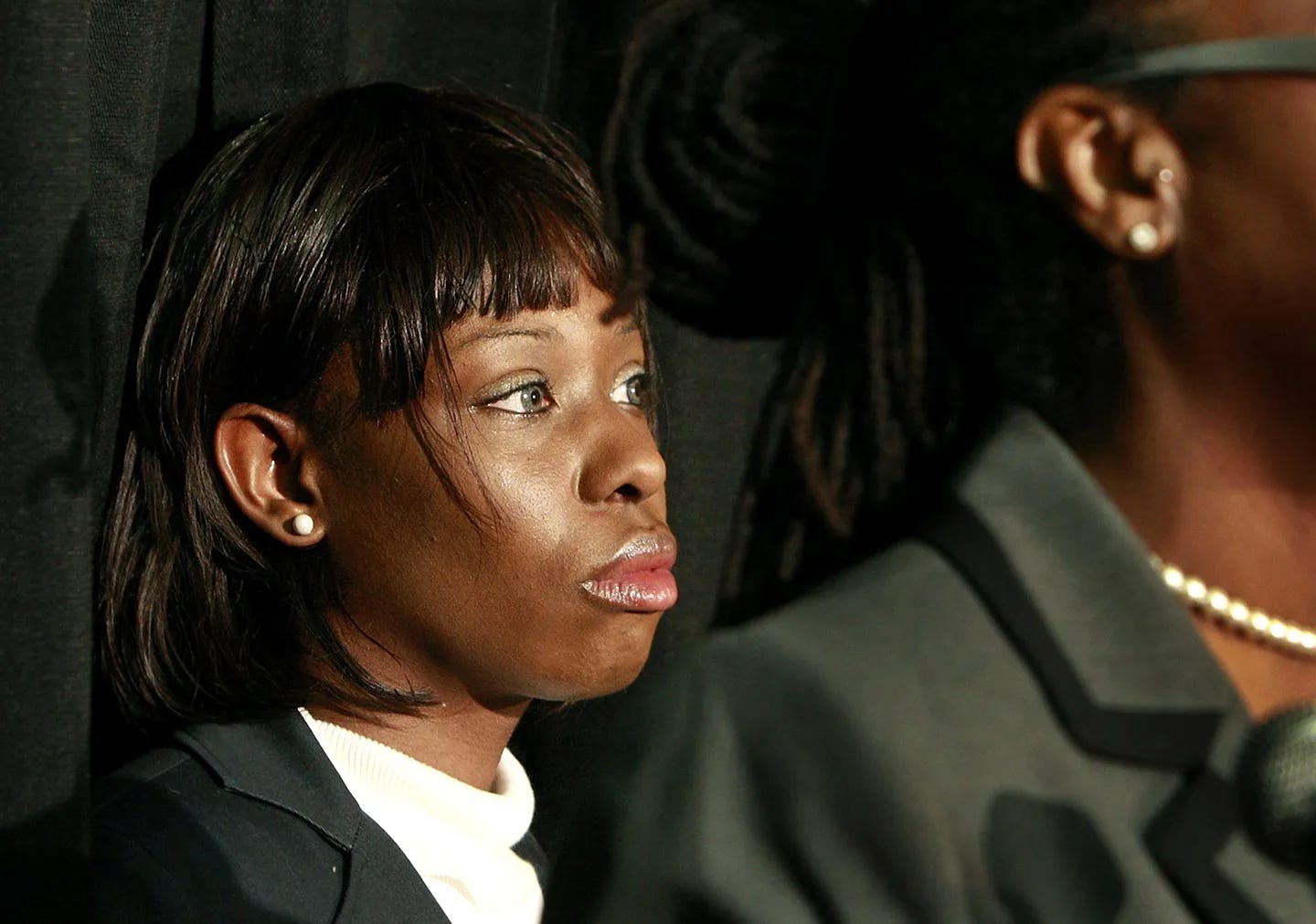30 for 30 for 30: FANTASTIC LIES (2016)

There are plenty of great documentaries that address rape on college, high school and military campuses. The Hunting Ground (2015). The Invisible War (2012). Roll Red Roll (2018). Athlete A (2020). At the Heart of Gold (2019).
These films are typically nuanced and examine the systemic problems that land rape victims in a spiritual, emotional and mental prison for most of their lives. They question the status quo and make viewers so angry that they’re mobilized into action. They take a look at the social, cultural and economic factors at play—the things that create an environment where these tragic events can, do and will happen. More often than not, your perspective changes on the issue.
And then there’s ESPN’s 30 for 30 documentary FANTASTIC LIES (2016). A weird, complex documentary that's illuminating and equally frustrating.
Directed by Marina Zenovich, who also directed LANCE (2020), FANTASTIC LIES examines the Duke lacrosse team’s infamous 2006 rape allegations case. For those unfamiliar, on March 13, 2006, during Spring Break, the Duke lacrosse team hired two dancers out of sheer boredom. One dancer ultimately filed rape allegations against three of the team members, sending the entire campus into a politicized spiral.
In the end, the dancer’s allegations were found to be baseless on a lack of evidence. Furthermore, the Durham County District Attorney, Mike Nifong, was disbarred for dishonesty, fraud, deceit and misrepresentation because of how he handled the case.
I'm really torn on this documentary. At times, I can appreciate what it highlights. At other times, I'm mad at things left out.
So let's start with the good. FANTASTIC LIES does a great job examining the aftermath of such allegations and how an entire town can get caught up in a polarized argument. People, campuses and institutions jump to one side, bringing in politics surrounding racism, sexism and privilege. These entities either crumble—like the Duke lacrosse team—or standfast in their convictions—like the District Attorney’s office—no matter what the truth may be. Some voices, like the black dancer who made the accusations or the other black dancer that was with her, are simply lost in the swell of things. Their voices simply cease to matter when media, political agendas, a prestigious college and a DA fighting for reelection come into play.
It also does a good job at setting the stage where this sort of powder keg can form. FANTASTIC LIES outlines the stark difference between Durham and Duke University, a dichotomy that fueled the political fire and spurred attitudes one way or the other.
So now the "bad." FANTASTIC LIES, being a sports documentary, focuses on the sport. That means you’re given the perspective of the Duke lacrosse team first and foremost. You’re presented with the team’s background, the coach’s commitment, the rise of the program to near-champions and its subsequent downfall due to its silence on the allegations. Because of this, the documentary seems a bit skewed.
The accused were never interviewed. Instead, we get members of the team who are, frankly, really glib on what happened that night. The coach was never interviewed. Instead, we get the players’ parents, who present us with their backgrounds, how good they are, how hard they work and how good they treat everyone. The stuff you typically hear from upper-class white suburban mothers and fathers. And there’s nothing wrong with that in and of itself. But given the context, there’s plenty wrong with that.
The accuser was never interviewed for the film, and her perspective is reduced to brief clips of her being interviewed for a police lineup and two sentences of a 911 call. The documentary hints she isn’t to be trusted throughout, going over her promiscuity and drug use, which have no bearing to her accusations. To Zenovich’s credit, there is a disclaimer (at the end) stating she did not want to be interviewed. But to Zenovich’s discredit, there’s a disclaimer stating she was currently in jail for something completely unrelated. There’s a lot being done here to discredit the accuser.
The accuser’s fellow dancer was never interviewed. The doctor who administered the rape kit was never interviewed or shown beyond her stating she conducted the rape kit. The neighbor who lived next to the team was never shown given his account for what happened that night. The police who conducted the investigation were never interviewed. The detective in charge killed himself after this took place, yes, but I’m sure he worked with a team– someone, anyone.
The entire prosecution’s side of the story is lost to Nifong’s dumbassery and a crucial timetable that cleared the team. And that’s it. The defense's position, however, is clearly laid out. You believe it, and understand why the three individuals are cleared. The prosecution's evidence is never examined, presumably because it doesn't exist. Us, as viewers, are never given the chance to look at it.
My main beef with FANTASTIC LIES is that it seems to posit something very dumb—that men being accused of rape is the ultimate injustice here. It fails to recognize that the justice system, which is skewed toward wealthy white privileged men, did indeed protect white privileged men. It’s not an exception within our country, it’s our country outing itself. Or maybe that was Zenovich's intentions? I have no idea. I'm just confused and frustrated.
It doesn't push the players interviewed about the racist remarks made at the party . It ignores the rape kit. Maybe I’m just jaded. I’ll even admit I’m biased to believe accusers more than the accused. But FANTASTIC LIES seems to be wasted breath when compared to the real problems it briefly touches upon, folks. There are no real winners here. But when the credits rolled, I was left with the following questions that I’ll leave with you in conclusion:
Who is this for? Do we really need a documentary examining the one time a white wealthy sports team was declared innocent? What problem does this single case address? Who does this serve—the overserved or the underserved, the overrepresented or the underrepresented, the marginalized or the popular?
This is the fifth entry in a series. Click here to read the first, second, third and fourth entries.








